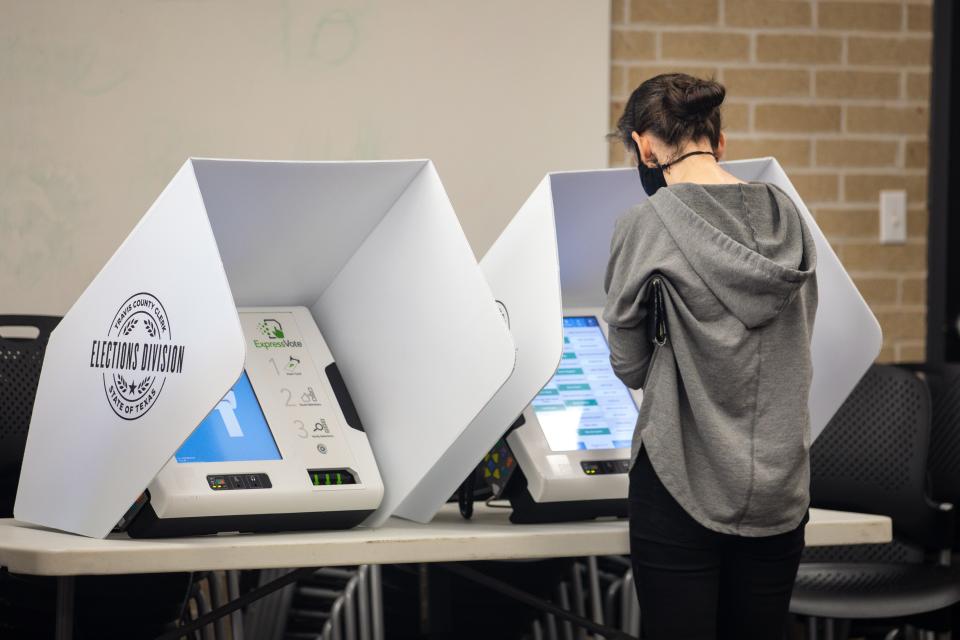An election without 'I voted' stickers? Election officials scrambling amid paper shortage
American elections are the latest industry to feel the squeeze of inflation and global supply chain disruptions.
As voters begin to cast ballots in the 2022 primaries, the election industry has been scrambling to get enough paper products to print ballots, stuff envelopes and produce other materials critical to the voting process.
Warnings about the availability of paper have circulated among election officials for months. But in February, a working group of election industry officials said in a report that orders typically filled in days or weeks now are taking months.
Prices, too, have spiked. With demand ticking up ahead of the election and a smaller supply from paper mills, election officials say they are paying more for paper products, putting more strain on an elections system that advocates say has been underfunded for years.
More: Voting rights activists are pushing to speak the language of all voters. It's not always English.
The shortage already is making it harder on voters. In Texas, some vote-by-mail ballots went out later than usual because local elections officials could not get their stock of paper early enough.
Election industry officials say paper mills have been closing for years and many shifted to producing corrugated boxes to meet demand for shipped goods during the pandemic. Transportation labor shortages also are making it harder to get paper, they said.
At the same time, new election laws adopted in several states have forced election officials to produce new materials that reflect those changes – such as new early voting hours and different vote-by-mail requirements – and in some cases resisted calls to digitize processes like absentee ballot requests.
More: Election workers faced new threats after 2020 election. Experts fear it will drive them away
Election officials also are competing with other industries that use paper products: from bank statements, credit card bills and advertisements, to the cardboard packaging used for various goods and the absorbent material in diapers.
Industry experts told USA TODAY they now expect to have enough specialized ballot paper for jurisdictions that need it, but the paper used for instructional material, envelopes and registration cards is increasingly difficult to procure.
Even “I voted” stickers are at risk.
“All of these things the election community needs all revolves around paper,” said Jeff Ellington, CEO of Runbeck Election Services, a Phoenix-based company that helps produce elections.

Early orders
Tammy Patrick, senior adviser to the elections program at the Democracy Fund, said elections will go on despite the paper shortage, but local officials will have to be creative, as they were during the 2020 pandemic election.
“There will be accommodations that will be made to make sure the election occurs on time and has legitimacy and integrity to it, but it may not happen in the way everyone has planned for,” she said.
Runbeck and other election vendors are warning their customers to order paper products early to account for the longer runway needed to get them.
Texas: Texas Congressman Van Taylor abandons reelection bid after admitting affair
That was among the recommendations in a report about the risks posed to elections by supply chain problems that have rippled across industries over the last year.
Before the pandemic, paper mills could deliver 10 truckloads as fast as four weeks, according to the report from the Election Infrastructure Sector Coordinating Council, a group of private election industry officials organized under the Cybersecurity and Infrastructure Security Agency.
Now, mills won’t guarantee that they can fulfill an entire order even with months of lead time, according to the report.
'Texas is a battleground': Latino voters torn between GOP and Democrats ahead of midterm elections
That means last-minute changes are off the table, and jurisdictions that traditionally wait until closer to the election to place orders need to speed up their preparation in 2022.
“They’re not going to have that big of a luxury this time,” said Kimberley Waltz, vice president for client relations and postal affairs at Cathedral Corporation, an election industry provider.
Ellington told USA TODAY that his company has gotten assurances from paper mills that they will fill orders for specialized ballot paper at the same quantities as they did in 2020, but it already has seen orders canceled in some cases for other products.
Ballot paper must follow precise specifications so it can be fed through scanners that read and tabulate votes. The paper must be the right shade of white and have the correct dimensions, and it can’t be recycled.
Primaries to watch: Yes, the midterms have begun. Primary voting starts today in Texas. Here are ten House races to watch in 2022
Delays already are being felt in early primary states, such as Texas. Texas lawmakers adopted new voting regulations after the 2020 election, and that forced local election officials to turn over their stock of materials to reflect the changes at the same time that paper was becoming harder to find, said Remi Garza, president of the Texas Association of Election Administrators.
In Cameron County on the southern tip of Texas, Garza said vote-by-mail ballots were delayed by nearly two weeks because of shipping slowdowns. Garza, who oversees elections in the county, sent his own crew on a 10-hour journey to San Antonio to pick up the ballots.
“All of the things that could happen badly are happening,” Patrick said.

Supply chain, production slowdowns slow delivery, higher prices
Difficulties acquiring paper start at the paper mills, experts said, but they don’t end there.
During the pandemic, paper mills slowed production as demand collapsed, and supply chain problems have made it difficult to import products that could help fill those gaps as the need for paper began to rebound, said Adam Josephson, a paper analyst at KeyBanc Capital Markets.
Paper mills shifted to producing packaging material instead, Josephson said, as people started shipping more goods to their homes.
Pennsylvania, Arizona, Alabama: the Senate primary races to watch in 2022
“They moved to where their dollars were,” Waltz said.
Labor shortages have limited paper mills’ ability to increase production, according to the report, and made it harder for transportation companies to deliver it.
Paper shortages also are driving up the cost of elections.
Waltz said prices are as much as 20% higher than they were last year. In Hamilton County, Ohio, election officials are spending 30% more on paper this year, said Sherry Poland, director of the county board of elections.
More: Voters get fewer choices as Democrats and Republicans dig partisan trenches in redistricting
The paper shortage was among the reasons election officials cited when they advocated against holding two primary elections as Ohio has struggled to finalize new district boundaries for state legislative and congressional seats.
They also have backed a bill that would remove a requirement in state law forcing election officials to buy products only from Ohio companies, said Aaron Ockerman, executive director of the Ohio Association of Election Officials. Going outside of Ohio would make it easier for local elections boards to find paper during the shortage.
“Ballot printing is a highly specialized niche industry within the printing business and it is fraught with peril as we have discovered and other states and jurisdictions have discovered,” he said. “You can’t just go out to your local Kinkos and print ballots.”
Poll takeaways: No, Trump shouldn't have taken those White House papers back to Mar-a-Lago
This article originally appeared on USA TODAY: 2022 Elections face paper shortages caused by supply chain, inflation

